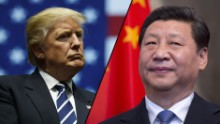How Barbara Corcoran beat Trump when she sued him?...
This is a true story told to me recently by my wife: Trump was selling something (a piece of property) that gave the real estate agent a commission of 3 million dollars. To understand this better this is something Trump Always does in Business. He didn't want to have to pay this young real estate agent her 3 million dollar commission so he made up a reason to sue her so he wouldn't have to pay her. She counter sued and won and wrote a book about it. However, this is Trump's thinking "There is a probability that a young real estate agent wouldn't want to give up 1.6 million to a lawyer and wouldn't go to the trouble of counter suing him and winning. For Trump, this is just good business. But, people like you and I, we would consider someone who does this just a complete asshole. So, this is who our president actually is.
This is why literally everything and anything is negotiable, nothing is sacrosanct to Trump. If you understand this then you understand who Trump is ongoing and what the future of the U.S. with Trump at the helm looks like.
How to understand Trump's recent flip-flops
Cillizza: Everything is negotiable in the world of Trump
Cillizza: Here's an easy way to understand all of President Trump's recent flip-flops
Story highlights
- Everything, in the world of Trump, is a negotiation
- What we see as flip-floppery and weakness, Trump sees as flexibility and uncertainty
Washington (CNN)In the space of the last week, President Donald Trump has either altered or totally reversed his views
on US involvement in Syria, Russia's friendliness (or lack thereof),
China's currency manipulation, Fed chair Janet Yellen, the Export-Import
Bank and NATO.
It's enough to
a) give you whiplash and b) raise legitimate questions about what Trump
actually believes, given that many of his current positions are directly
at odds with those that he staked out during the campaign. Is this a
new Trump? A more centrist, realistic one? And, if so, what changed?
The answer is that nothing has really changed.
Think
about what has always sat at the heart of how Donald Trump defines
himself: Deal-making. He became a national figure following the success
of his book, "The Art of the Deal." The persona that made him a reality
TV star was of a tough-bargaining deal-maker. He ran for president on
that same idea: I've done big deals all of my life. None of these
politicians know how to make the best deals, but I do.
Everything, in the world of Trump, is a negotiation -- up to and including facts. This quote, from "Art of the Deal," is deeply revealing about that Trump philosophy:
"I
never get too attached to one deal or one approach. For starters, I
keep a lot of balls in the air, because most deals fall out, no matter
how promising they seem at first."
The
fact is that Trump was miscast -- and willfully played into the
mischaracterization -- during the Republican primary fight as an
ideologue. He was able to carve out a niche within the party by leading
people to believe that his tough talk on things like immigration or
China's currency policies were evidence of a deep-rooted conservatism
and commitment to ideology that he would bring to the White House.
Trump
knew, for example, that conservatives thought then-President Barack
Obama kowtowed too often to NATO, so he took a hard line stance in
declaring the organization "obsolete." On Syria, Trump knew that there
was real resistance from the public to anything resembling a foreign
conflict with an uncertain time commitment and a muddy definition of
winning. So he came out hard against US involvement.
The
point is that Trump took these positions not because they were long and
deeply-held views but because they made sense for him politically at
the time. Conservatives wanted a brash, tough-talking outsider. That's
what Trump gave them.
He was able
to do so because he had never run for office before and so his positions
on virtually every issue were unknown. Trump, unlike, say, Jeb(!) Bush,
who had a long record of views on virtually every subject, could tailor
his issue positions to what the voters wanted.
Once
you understand that Trump views everything -- up to and including where
he stands on a given issue on any given day -- as a sort of extended
negotiation, it becomes far easier to understand how he could so quickly
and totally reverse himself on major issues like the US relationship
with China or whether the Export-Import Bank should exist.
The
positions he once took fit that moment. But now that he is president
and, in the words of White House press secretary Sean Spicer,
"circumstances change," Trump is entirely comfortable taking different
views.
What
we see as flip-floppery and weakness, Trump sees as flexibility and
uncertainty -- which he thinks are two hallmarks of any strong
deal-maker. Trump doesn't feel any allegiance to past positions or,
really, past statements about issues. Those are the sorts of things that
get in the way of making the best deals. And that's what Trump believes
the public wants from him, ideology or consistency be damned.

















No comments:
Post a Comment